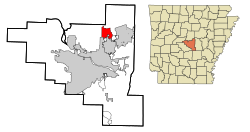Gibson, Pulaski County, Arkansas
| Gibson, Arkansas | |
|---|---|
| CDP | |
 Location in Pulaski County and the state of Arkansas |
|
| Coordinates: 34°52′56″N 92°13′41″W / 34.88222°N 92.22806°WCoordinates: 34°52′56″N 92°13′41″W / 34.88222°N 92.22806°W | |
| Country | United States |
| State | Arkansas |
| County | Pulaski |
| Area | |
| • Total | 4.451 sq mi (11.53 km2) |
| • Land | 4.451 sq mi (11.53 km2) |
| • Water | 0 sq mi (0 km2) |
| Elevation | 262 ft (80 m) |
| Population (2010) | |
| • Total | 3,543 |
| • Density | 800/sq mi (310/km2) |
| Time zone | Central (CST) (UTC-6) |
| • Summer (DST) | CDT (UTC-5) |
| ZIP code | 72116 |
| Area code(s) | 501 |
| FIPS code | 05-26710 |
| GNIS feature ID | 0077012 |
Gibson is a census-designated place (CDP) in Pulaski County, Arkansas, United States. The population was 3,543 at the 2010 census. It is part of the Little Rock–North Little Rock–Conway Metropolitan Statistical Area.
Gibson contains the silver deposits that gave North Little Rock its older name of Argenta (derived from the Latin word for silver).
Gibson was an early settlement in the Arkansas territory. The Southwest Trail military road, the route of most Americans headed to Mexico's Texas territory and the Republic of Texas, passed through Gibson. At one time, some 80 percent of Arkansas' settlers had arrived using the Southwest Trail.
Also known as the Old Military Road, the route passed from El Paso to North Little Rock through Gibson. From El Paso, Southwest Trail goes through current-day Arkansas Highway 89, then Tate's Mill Road to Batesville Pike Road through Gibson to Remount Road, to Arkansas Highway 176 and to Arkansas Highway 365 through North Little Rock.
After the Arkansas territorial capital was moved from Arkansas Post (Arkansas County) to Little Rock (Pulaski County) in 1821, settlers began to acquire land around the new capital, including land north of the Arkansas River. Most settlers were farmers growing cotton or subsistence crops. Many used land grants from the War of 1812 to take possession of land. Among the first to claim land in the future Gibson community were William Beech in 1821, William Johnson in 1822 and John Stone in 1822.
Gibson was the family name of some early of the area's settlers. Among Gibson Cemetery's dozens of graves are those of Mattie Cordelia Gibson, who died in 1915, and of her husband John Calvin, who died in 1951 on his 81st birthday.
...
Wikipedia
